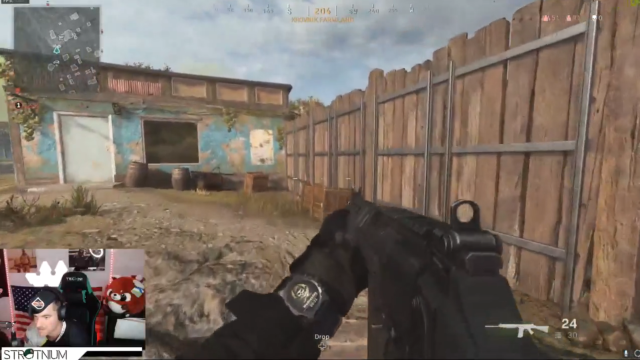Looks like the U.S. Army and Navy might not be able to squash the pacifist resistance that’s been rising up in its Twitch streams, mostly visitors dropping into the chats to reference war crimes (or “w4r crimes” or “war c rimes”). Over the past few weeks, we’ve heard about how the U.S. Army’s esports team has been grooming kids as young as 13 on Twitch with shoot-em-up games and tournaments for prizes, and that’s creepy. Now, some argue that their mass bans of critics violate First Amendment rights.
The Washington Post reports that the Army said it has so far banned 300 Twitch users.
The Army first incited protests after an alarmingly adorable June 30 tweet ” the anime kitten face emoticon “UwU“ ” at Discord’s Twitter account. Users bombarded the U.S. Army’s Discord server with a speedrun to see who could get banned the fastest, and then flocked to the Twitch channel.
In a video shared on Twitter, activist Jordan Uhl can be seen trying to post the message: “whats your favourite us war crime?” followed by an auto-reply that told him that the message wasn’t allowed under the channel’s moderation settings. After Uhl posted “what’s ur favourite u.s. w4r crime?” followed by a link to the Wikipedia page for U.S. war crimes, Army esports player and Green Beret and sniper Joshua “Strotnium” David can be heard saying a “have a nice time getting banned, my dude.”
just having a good time with the US Army esports twitch stream @JordanUhl pic.twitter.com/qnjyxg1KP0
— Rod Breslau (@Slasher) July 8, 2020
“You guys have banned every word related to any criticism of the army,” one user wrote in the chat a few weeks ago. “You get banned for asking about war c rimes?” another asked.
The Navy followed suit, was credibly accused of war crimes. In a piece for the Nation, Uhl reported that a Navy streamer on Twitch warned user xCanyon916 that they could be banned for mentioning the Navy’s recruitment tactics.
Twitter user Fatima Al-Essa told Gizmodo over DM that she’d joined the Army Discord protest because her parents fled to Sweden as a result of the Iraq War. (Gizmodo was unable to independently verify this by publication time.) Al-Essa said that she was banned within seconds after posting “how many xp when u drone strike an iraqi child.” She said that she was not contacted by mods, and that she was unable to rejoin the server.
got banned for asking this https://t.co/wgRdiS4oxh pic.twitter.com/WK3JVtkRJx
— fatima (@Iovelitchi) June 30, 2020
“The government’s actions here are plainly unconstitutional,” Electronic Frontier Foundation legal fellow Naomi Gilens told Gizmodo. “When a government official or agency creates a forum for speech online and invites the public to participate, it can’t censor speech just because it doesn’t like the message or viewpoints being expressed.”
USArmyEsports has fabricated its own lengthy “User Agreement,” independent of Twitch’s rules, which dictates its rules about speech, including this ordinance:
The Department of Defence reserves the right, but undertakes no duty, to review, edit, move or delete any material submitted as a comment to the information provided for display or placed on the social media sites in its sole discretion, without notice.
“The government can’t “˜reserve the right’ to censor speech in violation of the First Amendment, because it doesn’t have any right to violate the First Amendment in the first place,” Gilens told Gizmodo ” at least, not when it comes to “censoring speech based on its content or viewpoint.”
Gilens added that several cases have recently addressed precisely this issue. Over the past few years, for example, a federal judge and a federal appeals court ruled that Donald Trump, whose account is unfortunately a forum to discuss high-level government affairs, can not block Twitter users.
“The relevant First Amendment principles here have been well-settled for many years, even if the technology here is relatively new,” Jameel Jaffer, director of the Knight First Amendment Institute at Columbia University, which filed the lawsuit on behalf of Twitter users blocked by Trump, told Gizmodo. Jaffer argued that the Army has opened “a forum for First Amendment purposes,” a space for public expression, which the Army can’t simply wall off to critics whose opinions don’t conform to its ideology.
“And in this particular context, the value of the speech that’s being suppressed is obviously significant,” Jaffer added. “It’s bad enough that the President is pardoning war criminals; we don’t also need the Army censoring conversations about war crimes.”
Twitch is inherently a public forum, but the U.S. Army doesn’t conceal the fact that it’s leveraging it as a recruiting tool: Esports news can be found under the Army’s recruitment page, and Uhl noted in the Nation that a link to the costly Xbox Elite Series 2 controller, the prize for a tournament, led directly to an Army recruitment site. After persistent complaints about the prize lures, Twitch finally forced it to remove the link.
A Twitch spokesperson told Gizmodo that it had required the Army to remove the link because its terms on promotions require users to “comply with all applicable laws,” and the promotion “did not comply with our Terms.”
We can reasonably assume that Twitch doesn’t plan to wade into the First Amendment debate, about which Twitch declined to comment to Gizmodo, instead referring us to its FAQ on bans and suspensions. “Channel owners and moderators are free to ban anyone from their channel, regardless of the reason,” it reads. “Twitch Staff will not assist in reversing channel-specific bans.”
Neither the U.S. Army nor the Navy has responded to Gizmodo’s request for comment. We’ll update the post if we hear back.
